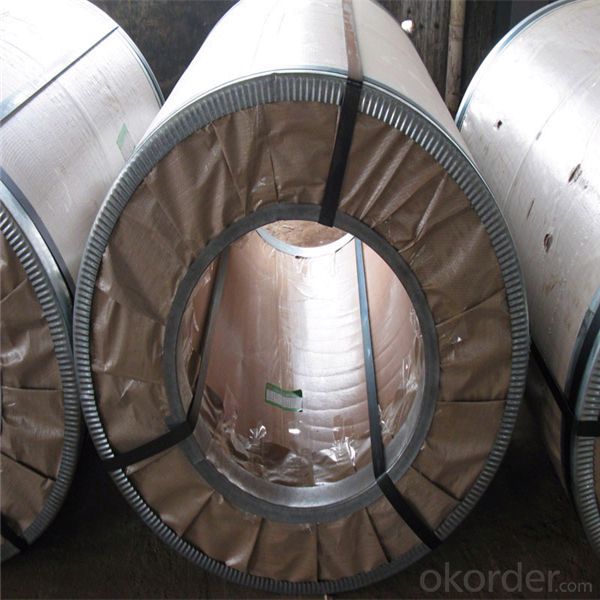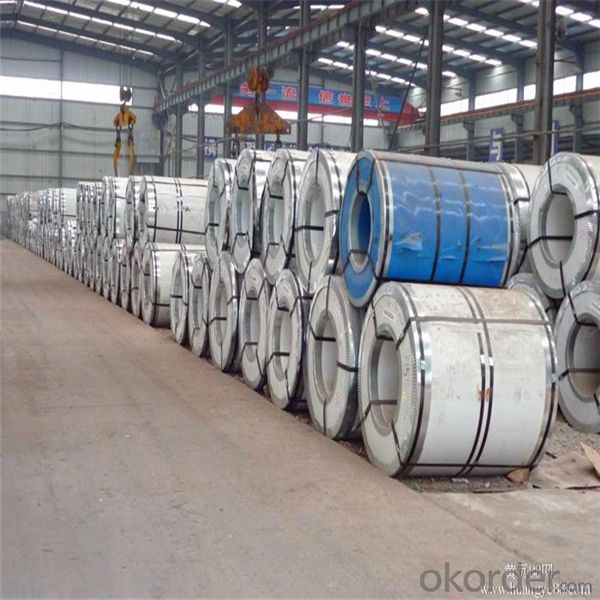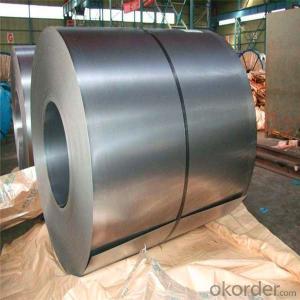SPCC Prime Cold Rolled Steel Coil/Made in China
- Loading Port:
- China main port
- Payment Terms:
- TT OR LC
- Min Order Qty:
- 20 m.t.
- Supply Capability:
- 10000 m.t./month
OKorder Service Pledge
OKorder Financial Service
You Might Also Like
Item specifice
SPCC Cold Rolled Steel coil
Specification
Cold Rolled Full Hard Steel Coil
Main Qualtiy Standard | JIS G3141, GB11253 |
Mill Type | two stand CVC 6-high reversing mill from German SMS Demag; single stand 6-high reversing mill from Japanese Mitsubishi Hitachi |
Surface Type | glaze |
Inner Diameter | φ 610mm |
Outer Diameter | φ 1,200mm upto 2,050mm |
Weight per Coil | max 28,000kg |
Capacity | CCM 500,000 tons/year, RCM 20,000 tons/year |
Rolling Force | CCM 18,000KN, RCM 14,700KN |
Rolling Speed | max 1,200m/min |
Specification | 0.25mm upto 1.2mm ×900mm upto 1265mm |
Packing | export standard packaging;horizontal packaging |
Inner Diameter | φ 508mm |
Cold Rolled Annealed Steel Coil
Main Quality Standard | JIS3141, EN10130, DIN1623, ASTM A1008/1008M GB5213 |
Annealing Type | 20 hydrogen annealing furnaces from Austria EBNER |
Specification | 0.25mm upto 1.2mm ×900mm upto 1265mm |
Weight | max 10,000kg |
Yield Strength | 100 Mpa upto 280 Mpa |
Products inside Diameter | φ508mm or φ610mm |
Outer Diameter | max φ2,050mm |
Packing | export standard packaging; horizontal packaging |
Capacity | 300,000 tons/year |
Quality Control
With strict observation of lean management requirement,the company strictly examines and tests all processs.Each link from raw material supply to R&D and production and quality test of finished product all abide strictly execute ISO Quality Management System Standard.
Product Image


- Q:How do steel coils contribute to the manufacturing of electrical equipment?
- Steel coils are used in the manufacturing of electrical equipment as they provide structural support and enhance the durability of various components. They are commonly used in transformers, motors, and generators, where they serve as the core material due to their magnetic properties. The steel coils help to create and maintain magnetic fields, ensuring efficient energy transfer and enhancing the overall performance of electrical equipment.
- Q:At what temperature does steel start to warp or soften.
- Just okorder
- Q:How do steel coil manufacturers handle product recalls?
- Steel coil manufacturers handle product recalls by following a systematic process to ensure the safety and satisfaction of their customers. Here is an outline of the steps involved in handling product recalls: 1. Identification of the issue: Once a potential problem or defect is discovered in the steel coils, manufacturers initiate the recall process. This may be due to a quality control failure, safety concern, or non-compliance with industry standards. 2. Investigation and evaluation: The manufacturer investigates the root cause of the problem and evaluates the potential impact on customer safety and satisfaction. They analyze the affected batch or production run to determine the extent of the issue. 3. Notification: Manufacturers promptly notify customers who have purchased the affected steel coils. They use various channels, such as direct mail, email, phone calls, or public announcements, to inform customers about the recall. The notification includes specific details about the problem, potential risks, and instructions on how to proceed. 4. Retrieval and replacement: The manufacturer provides instructions on how customers can return or dispose of the recalled steel coils safely. They may offer options for product retrieval, such as direct pick-up from the customer's location or designated drop-off points. In some cases, manufacturers may provide replacement steel coils or reimburse customers for the affected products. 5. Public communication: Steel coil manufacturers issue public statements and notifications to inform the wider market, distributors, and retailers about the recall. This ensures that all stakeholders are aware of the issue and can take appropriate actions to address it. 6. Corrective actions: After retrieving the recalled steel coils, manufacturers implement corrective actions to rectify the issue. This may involve improving their quality control processes, upgrading manufacturing equipment, or revising product specifications to prevent future recalls. 7. Customer support: Throughout the recall process, manufacturers provide customer support to address any concerns, questions, or complaints. They establish dedicated hotlines, email addresses, or online portals to assist customers with their inquiries and guide them through the recall process. 8. Regulatory compliance: Steel coil manufacturers ensure compliance with relevant regulatory authorities and standards organizations during the recall process. They work closely with regulatory agencies to provide necessary information, documentation, and updates to address any legal requirements. Overall, steel coil manufacturers prioritize customer safety and satisfaction when handling product recalls. They follow a well-defined process that involves identification, investigation, notification, retrieval, replacement, public communication, corrective actions, customer support, and regulatory compliance. Through these steps, manufacturers aim to rectify the issue, prevent harm, and maintain trust with their customers.
- Q:looking for a good pocket knife. i keep going through these 440 steel pocket knives with every day work usage. this will be my 4th. even when i use a whetstone they stay sharp for a short period of time but the edge does not last, 440 is too soft! what is a good steel to look for in a pocket knife? also what are some good brands. ive been using gerber and buck sofar. if you could recommend me a few mid/small sized knives i would greatly appreciate it!
- There okorder /
- Q:should I shoot Herters .308 steel cased ammo in my Remington 7400.and why shouldn't I?
- Won't hurt anything, but do be aware, if you're plinking with it, that FMJ (and maybe even steel core), cheap ammo offers more chance of penetration and ricochet so be sure you've got a good back-stop so you know where those rounds wind up.
- Q:What are the different types of coil leveling machines?
- There are several different types of coil leveling machines used in various industries. Some of the most common types include: 1. Precision Roll Levelers: These machines are highly accurate and capable of leveling coils with high precision. They use a series of rolls to apply pressure and remove any distortions or imperfections in the coil. 2. Straighteners: Straighteners are used to flatten coils that have become curved or warped during the manufacturing process. They typically consist of a set of rollers that gradually bend the coil in the opposite direction to restore its flatness. 3. Rotary Levelers: Rotary levelers are used to level coils that are thicker or have a higher yield strength. They utilize a series of rolls that rotate in opposite directions to apply pressure and flatten the coil. 4. Tension Levelers: Tension levelers are commonly used for leveling thin-gauge coils. They work by applying tension to the coil while passing it through a series of rollers. This process helps to remove any waviness or unevenness in the coil. 5. Stretch Levelers: Stretch levelers are specifically designed to level coils made of high-strength materials. They use a combination of stretching and bending to remove any irregularities in the coil's surface. 6. Cut-to-Length Lines: These machines not only level the coil but also cut it into specific lengths as per the customer's requirements. They are commonly used in industries where precision and customization are essential, such as automotive or construction. Overall, the choice of coil leveling machine depends on factors such as the type and thickness of the coil, desired level of accuracy, and the intended application of the leveled coil.
- Q:How are steel coils used in the manufacturing of industrial equipment?
- Due to their versatility and strength, steel coils find common application in the manufacturing of industrial equipment. Typically crafted from high-quality steel, these coils are shaped into a coiled form for convenient transportation and storage purposes. One of the primary purposes of steel coils in the manufacturing of industrial equipment is the creation of structural components. Often, these coils are cut, shaped, and welded to produce various parts and structures that offer support and stability to the equipment. For instance, frames, beams, and brackets, which serve as the backbone of heavy machinery, can be constructed using steel coils. Moreover, steel coils are utilized in the production of mechanical components like gears, shafts, and bearings. These components necessitate high strength and durability to withstand the demanding loads and harsh conditions encountered in industrial settings. By employing steel coils, manufacturers can ensure that these parts possess the requisite strength and resilience for reliable performance. Additionally, steel coils are incorporated into the manufacturing of equipment surfaces that require corrosion resistance or aesthetic appeal. Steel with specific coatings or finishes can be rolled into coils to create sheets or plates, which are employed in constructing outer casings, panels, or covers for industrial equipment. These coatings not only protect the equipment from environmental factors but also enhance its visual appeal. Furthermore, steel coils can be transformed into pipes and tubes, which are essential components in numerous industrial applications. These pipes serve the purpose of transporting various fluids, gases, or materials within the equipment. The strength and structural integrity of steel coils guarantee that the pipes can endure high pressure, temperature, and mechanical stress, rendering them suitable for demanding industrial environments. In summary, steel coils occupy a vital role in the manufacturing of industrial equipment. They are utilized in fabricating structural components, mechanical parts, surface finishes, and pipes. The versatility, strength, and durability exhibited by steel coils make them the preferred choice in the industrial equipment manufacturing industry.
- Q:What are the challenges in coil blanking for complex shapes?
- In order to achieve accurate and efficient results, there are several challenges that need to be addressed when it comes to coil blanking for complex shapes. One of the main challenges lies in the precise positioning and alignment of the coil material. When dealing with complex shapes, intricate cutting patterns are often required, and any misalignment or deviation can result in inaccurate cuts and wasted material. Another challenge involves the selection and optimization of the blanking tooling. Specialized dies and punches are often necessary for complex shapes, and these need to be carefully designed and manufactured to ensure accuracy and consistency. This not only involves choosing the right tooling materials but also considering factors such as cutting forces, wear resistance, and tool life. The complexity of the shapes also presents challenges in terms of material deformation and springback. During the blanking process, the material undergoes various deformations and stresses, which can cause distortions and dimensional variations in the final product. Achieving the desired shape while minimizing these deformations requires a deep understanding of material properties and advanced techniques like compensation and adjustment in the die design. Furthermore, the high-speed nature of coil blanking for complex shapes can result in increased vibration and noise levels. The dynamic forces involved in cutting intricate shapes can lead to tool chatter and excessive noise, affecting both the quality of the cut and overall operational efficiency. It is vital to implement effective damping and vibration control measures, such as tool coatings and optimized cutting parameters, to address these challenges. Lastly, the complexity of the shapes can impact production efficiency. Complex shapes often require longer tool setup times and more frequent tool changes, leading to increased downtime and reduced productivity. Additionally, the intricate nature of the cuts may require multiple passes or additional machining operations, further adding to the production time and complexity. To overcome these challenges, manufacturers need to invest in advanced technologies like computer-aided design and simulation software to optimize the blanking process. Continuous research and development efforts focused on improving tooling materials, cutting techniques, and process control can also help address the challenges associated with coil blanking for complex shapes.
- Q:I also heard Stainless holds up better againts rust, blue steel needs more care.
- They have different properties. Bluing on steel is a surface treatment that helps inhibit rust, but doesn't prevent it. It will wear off with use over time, but can be redone. Stainless steel refers to a particular type of steel alloy, usually incorporating nickel and chromium, that is highly resistant to rust on its own, so doesn't need a surface treatment. Because the steel itself is what is rust resistant, that property can't wear off. All other things held equal, the carbon steel that bluing is typically applied to tends to be slightly more rigid and brittle than stainless steel. It may hold an edge better than stainless. In most applications, those differences are small enough not to matter for practical purposes. For example, both knives and guns are made with blued steel and stainless steel. Which a person gets is usually a matter of preference (unless you're, say, a professional restaurant chef whose knives have to hold a fine edge through constant hard use).
- Q:Or is it a coating that is applied? If so what types of steel? Or what types of coatings?
- No, usually they are just coated or galvanized. To make a steel that is truly more corrosion resistant raises it's cost quite markedly, where as coatings are pretty cheap. Almost all structural steel is just A36 mild steel (like 0.1% carbon, 0.05% Mn, and not much else). There are higher grades of structural steel, and bridges are made with truly more corrosion resistant carbon steels, but for a house it's just not the case.
1. Manufacturer Overview |
|
|---|---|
| Location | |
| Year Established | |
| Annual Output Value | |
| Main Markets | |
| Company Certifications | |
2. Manufacturer Certificates |
|
|---|---|
| a) Certification Name | |
| Range | |
| Reference | |
| Validity Period | |
3. Manufacturer Capability |
|
|---|---|
| a)Trade Capacity | |
| Nearest Port | |
| Export Percentage | |
| No.of Employees in Trade Department | |
| Language Spoken: | |
| b)Factory Information | |
| Factory Size: | |
| No. of Production Lines | |
| Contract Manufacturing | |
| Product Price Range | |
Send your message to us
SPCC Prime Cold Rolled Steel Coil/Made in China
- Loading Port:
- China main port
- Payment Terms:
- TT OR LC
- Min Order Qty:
- 20 m.t.
- Supply Capability:
- 10000 m.t./month
OKorder Service Pledge
OKorder Financial Service
Similar products
New products
Hot products
Related keywords




























